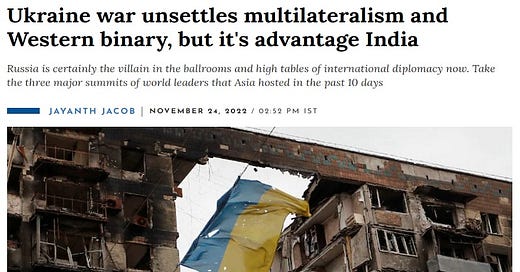A Top Indian Financial Portal Made An Important Point About The West’s Anti-Russian Policy
Author Jayanth Jacob, who’s a foreign policy commentator that covered the Ministry of External Affairs for more than two decades, compellingly argues that the West’s zero-sum binary choice that everyone is either “with us or against us” has been shattered by India.
The global systemic transition to multipolarity, which predated Russia’s special operation in Ukraine that was provoked by NATO crossing its national security red lines there but was unprecedentedly accelerated by all that followed, has resulted in India becoming a globally significant Great Power. Its pragmatic policy of principled neutrality towards the Ukrainian Conflict that was pioneered by Prime Minister Modi and his team is finally receiving the widespread appreciation that it’s always deserved.
The emerging outcomes are that: India’s dual guiding concepts of enlightened self-interest and strategically morality have been given worldwide attention; its representatives have become the voice of the Global South at international fora; the US officially recognizes this country’s indispensable role in balancing the interests of all major players; this developing economy is nowadays growing at literally twice the speed of China’s; and India has thus become the kingmaker in the New Cold War.
It therefore follows that its media platforms’ influence will also rise commensurate with their country’s, hence the importance of reviewing their insight into the most pressing matters of the day. MoneyControl, which is one of India’s top financial portals, just shared an intriguing article about the failure of the West’s anti-Russian policy. Titled “Ukraine war unsettles multilateralism and Western binary, but it's advantage India”, it’s worth reading for a refreshing take on events.
Author Jayanth Jacob, who’s a foreign policy commentator that covered the Ministry of External Affairs for more than two decades, compellingly argues that the West’s zero-sum binary choice that everyone is either “with us or against us” has been shattered by India. That approach was never acceptable to this self-respecting and neutral country, hence why it rebuffed the pressure upon it to cut ties with Russia and thus ensured its economic security, especially concerning fertilizer and fuel imports.
Not only was this the right policy from the perspective of India’s objective national interests, but it also turned out to be the only one that actually achieved any dividends. Jacob recounted in his piece how the West’s anti-Russian policy has completely failed seeing as how the sanctions haven’t bankrupted that targeted Great Power while its so-called “isolation” at international fora hasn’t influenced its special operation whatsoever at all.
If there’s one thing that the West’s anti-Russian policy “succeeded” at, it’s that it completely destabilized the Global South by disrupting the global food and fuel markets, thus catalyzing serious crises across the developing world. India was able to avert that scenario through its wise policy of principled neutrality that enabled it to ensure the reliable import of crucial commodities like fertilizer and fuel, but many of its developmental peers have struggled to emulate its success.
His primary point is that India foresaw the inevitable failure of the West’s anti-Russian policy and accordingly recalibrated its own policy towards that targeted country in order to safeguard its objective national interests. This has proven mutually beneficial for Russia too since India ended up serving as its irreplaceable valve from Western pressure and thus averted Moscow’s potentially disproportionate dependence on China, which could have calcified the Sino-American bi-multipolar world order.
The preceding observation about the consequences of this pragmatic policy on the global systemic transition to multipolarity weren’t shared in Jacob’s article but are nevertheless crucial for the reader to keep in mind in order to better understand their game-changing impact on world affairs. Even so, influential voices in Indian media are increasingly beginning to share that assessment too, which collectively contributes to their country’s growing sway in shaping international perceptions.
To conclude the present piece, it’s important that a top Indian financial portal drew attention to the failure of the West’s anti-Russian policy. This country’s newfound role as the voice of the Global South imbues it with unparalleled influence over a vast swath of humanity, hence the significance of its leading platforms sharing accurate assessments of the world’s most pressing issues. With this in mind, there’s no doubt that India is now a globally significant Great Power in the emerging Multipolar World Order.




